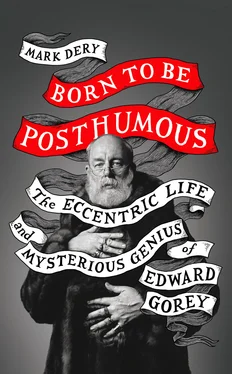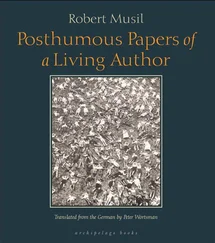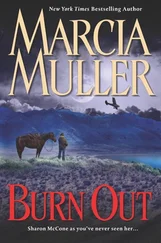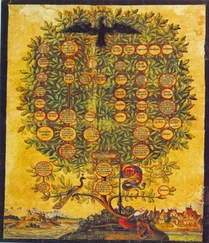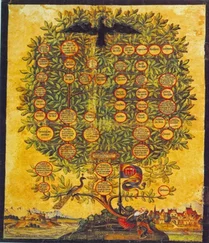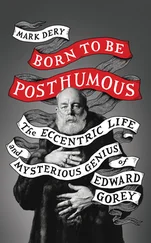That fall, Gorey was at work on Paint Me Black Angels , too, or rather its fraught beginnings: “It has now reached the point where every time I sit down to start it again, psychological blocks of various nasty sorts start sitting on my head,” he told Brandt. “I have the vague suspicion that I shall still be working on the first chapter on my deathbed …” 46This, of course, is Mr. Earbrass’s plight in The Unstrung Harp , a comic-gothic meditation on the horrors of the blank page. Could Gorey’s abortive attempt at a novel have been the midwife of the first of his little books? The Unstrung Harp is a novel writ small that showed him a way out of his impasse: rather than beat your brains out trying to make a masterpiece, write an unsmilingly unserious little book, a mere bagatelle, about writer’s block. If The Unstrung Harp was the brainchild of the novel that never was, it may have confirmed Gorey in his belief that “the perfect works of art of this world … are almost invariably on a small scale.” 47
Most of Gorey’s poems and fictions had their origins as assignments for the creative-writing classes he took in his sophomore year with the young poet John Ciardi. Boston born and bred from working-class Italian-American stock, Ciardi was a firm believer in poetry that spoke to a mass audience. Donald Hall, who took the course with Gorey and O’Hara, remembers him as “a superb teacher” who “took our writing seriously enough to give us a bad time.” 48
Intriguingly, it was Ciardi who fanned Gorey’s interest in the mock moralistic, encouraging him to parody the sermonizing voice of traditional children’s literature. Like Gorey, he recalled childhood as fraught with “intensities and losses,” a time of “enormous violence,” figuratively and literally. 49He scorned the “sugar-coated moralities” of most poetry intended for kids, which he thought sounded as if it were “written by a sponge dipped in warm milk and sprinkled with sugar”; his children’s verse, he said, was written “in the happy conviction that children were small savages with a glad flair for violence.”
Gorey got to know Ciardi “fairly well”; he, O’Hara, and George Rinehart, son of the Rinehart who founded the New York publisher Holt, Rinehart & Winston (and grandson of the mystery writer Mary Roberts Rinehart), would often join their professor after class for caffeine-fueled bull sessions at a nearby coffee shop. 50When Ciardi and his wife needed some wallpaper steamed from the walls of the apartment they were renovating, they recruited Gorey, O’Hara, and Rinehart for the job. “They were at it for days as they played a game of killing insults,” Ciardi recalled. “They were beautiful and bright and I have never come on three students as a group who seemed to have such unlimited prospects.” 51After a day’s hard work peeling wallpaper while Rossini overtures blared from the record player, the trio would join Ciardi and his wife, Judith, for spaghetti washed down with wine. Judith thought the three young men were “the funniest people in the world, with tongues like scalpels.” 52
Ciardi had no doubt that O’Hara was a prodigious talent, writing “like a young Mozart,” although the young poet’s worship of style over sincerity led his professor to observe that he “showed his brilliance rather than his feelings.” 53As for Gorey, who shared O’Hara’s fascination with irony, parody, artifice, and nonsense, along with his aversion to the earnest, confessional voice, Ciardi’s comments on his papers are keenly insightful. Ciardi could be as pitiless in his written remarks as he was solicitous in class, and his analysis of Gorey’s cultivated artificiality and ironic distance from his subject matter is both penetrating and prophetic, foreshadowing charges leveled at Gorey’s work in later years.
Ciardi’s response to a ten-page short story Ted submitted on October 27, 1947, for his English A-1a course is illuminating. “The Colours of Disillusion” (note Gorey’s Anglophilic insistence on British spelling) is a Firbank knockoff, from its gossipy cocktail-party setting to the near-fatal preciosity of the writing. But it’s not all Firbank; already Gorey’s comic-macabre aesthetic is spreading its dark wings. The setting is vaguely Victorian-Edwardian, as is the language (“‘How too frightening,’ said a young man with a soigné moustache”); “the eldest lady of the party” is addicted to shilling shockers; a child is in peril; “great black beards” are fetishized, cathected with infantile notions of “all that was good and kind and moral and strong”; a young woman pours vitriol—literally—on her sleeping husband’s face. 54
Ciardi gives Gorey an A, then renders judgment in full: “It begins to appear inevitable that I can never do more than pass your stories back with a question mark. Actually I think it’s your question mark. Everything you’re writing is flawless and unfinished. Unfinished in the sense that you’re following your own instinct but haven’t found it completely. When you do, it—your writing—will, I suspect, be either transcendent or simply pointless, depending on whether you follow it into some idea of order, or merely into the bric-a-brac of amusing reverie.” 55Ciardi is prescient in his observation that Gorey is guided by a lodestar all his own, as he will be for the rest of his creative life. And he’s right to point out that Ted’s sensibility is taking shape but hasn’t yet coalesced.
But he misses the mark when he says that Gorey must choose between transcendence and pointlessness. Gorey, who straddled Taoism and Dadaism, irony and existentialist angst, made a career of defying dualisms, in the course of which he produced works that managed to be both marvelous and pointless, serious and frivolous. Again, Sontag is helpful: “There are other creative sensibilities besides the seriousness (both tragic and comic) of high culture,” she writes in “Notes on ‘Camp.’” “Camp involves a new, more complex relation to ‘the serious.’ One can be serious about the frivolous, frivolous about the serious.” 56
Ciardi’s critiques were love notes compared to Professor Kenneth P. Kempton’s comments on a story submitted for his English 1b course, which Gorey took in the spring of ’49. “Your rococo manner, derived from self-consciousness and reading, is here made more than usually irritating by meager content spread very thin,” he wrote in a critique that can be fairly described as withering. 57He gave it a C.
Undeniably, Gorey’s undergraduate efforts earn his professors’ criticisms—and then some. The brittle artificiality of his drawing-room comedies, his thinly drawn characters, his inability to resist overegging the pudding of his prose style: the Firbankian posturing quickly grows tiresome. Then again, shameless imitation is part of any young writer’s apprenticeship. “That’s what happens to young people in college,” said a friend of O’Hara’s, commenting on Frank’s Wildean affectations at Harvard. “They decide on their mentor and they go all the way trying to be like him.” 58
At the same time, there’s a culture war going on here between naturalism and what I’ll call unnaturalism: between the novel as an exercise in depth psychology, plumbing the neuroses of realistic characters, and the novel as a puppet show where we see the human comedy—the masks we wear, the little dramas we act out—from a wry, ironic remove. It’s naturalism versus aestheticism, Hemingway in A Moveable Feast exhorting himself to “write the truest sentence that you know” versus Wilde in “The Decay of Lying” lamenting the “morbid and unhealthy faculty of truthtelling.” 59But we can also see this clash of artistic philosophies as a proxy war for the conflict between masculinity American-style (whose literary correlative is the “lean” and “muscular” style of tough-guy modernists like Hemingway and Mailer, with their terse sentences and their commitment to fiction as hard truth, straight up, no chaser) and its mauvish discontents.
Читать дальше
